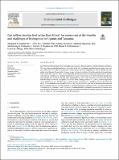| dc.description.abstract | East Africa has the potential to boost its urban food production through adoption of soilless farming techniques. The case study assessed the benefits and drawbacks allied with hydroponic vegetable farming among urban and peri‑urban farms in Northern Tanzania and Central Uganda. Snowball sampling was used to identify 150 vegetable farms/farmers through urban farmers’ groups and recommendations from the agricultural organizations from Uganda and Tanzania. Based on the complexity and distinctiveness of this farming system, only 51 individuals engaging in hydroponic vegetable production took part in responding to the semi-structured Google form questionnaire that was issued through social media platforms, face to face interviews and farm visits. Results from the study showed that hydroponics is a climate smart farming system (n = 13, 26%), produces high yields within limited space (n = 24, 48%), has no soil borne pests and diseases (n = 10, 20%) and gives the farmer the ability to control environmental conditions (n = 2, 4%). On the contrary, over 50% of the respondents reported high investment costs (n = 16, 31%) and lack of adequate knowledge on hydroponics (n = 11, 22%) as the main limitations of the technology. Based on farmers’ recommendations, hydroponics has potential to increase food security within urban areas if more efforts are put in sensitization about the farming system and research into ways to reduce the high costs associated with the technology. | en_US |

